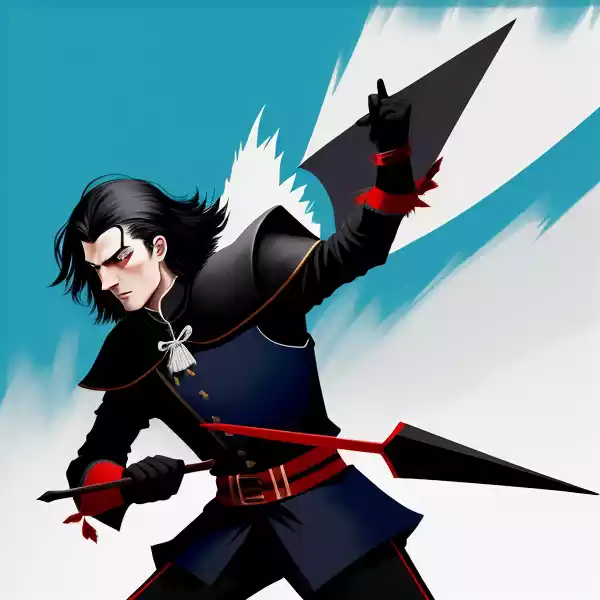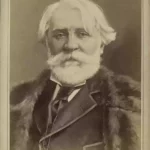 | |
The Duellist | |
| Author | Ivan S. Turgenev |
|---|---|
| Published |
1847
|
| Language | English |
| Original Language | Russian |
| Nationality | Russian |
| Genre | Realism, Russian Literature |
1847 Short Story
The Duellist
The Duellist is an English Realism, Russian Literature short story by Russian writer Ivan S. Turgenev. It was first published in 1847. The Duellist was published in 1847, early in Turgenev's career, well before his masterwork of realism, Fathers and Sons (1862). Translation by Constance Garnett.
The Duellist
by Ivan S. Turgenev
THE DUELLIST
I
A regiment of cuirassiers was quartered in 1829 in the village of Kirilovo, in the K- province. That village, with its huts and hay-stacks, its green hemp-patches, and gaunt willows, looked from a distance like an island in a boundless sea of ploughed, black-earth fields. In the middle of the village was a small pond, invariably covered with goose feathers, with muddy, indented banks; a hundred paces from the pond, on the other side of the road, rose the wooden manor-house, long, empty, and mournfully slanting on one side. Behind the house stretched the deserted garden; in the garden grew old apple-trees that bore no fruit, and tall birch-trees, full of rooks’ nests. At the end of the principal garden-walk, in a little house, once the bath-house, lived a decrepit old steward. Every morning, gasping and groaning, he would, from years of habit, drag himself across t he garden to the seignorial apartments, though there was nothing to take care of in them except a dozen white arm-chairs, upholstered in faded stuff, two podgy chests on carved legs with copper handles, four pictures with holes in them, and one black alabaster Arab with a broken nose. The owner of the house, a careless young man, lived partly at Petersburg, partly abroad, and had completely forgotten his estate. It had come to him eight years before, from a very old uncle, once noted all over the countryside for his excellent liqueurs. The empty, dark-green bottles are to this day lying about in the storeroom, in company with rubbish of all sorts, old manuscript books in parti-coloured covers, scantily filled with writing, old-fashioned glass lustres, a nobleman’s uniform of the Catherine period, a rusty sabre with a steel handle and so forth. In one of the lodges of the great house the colonel himself took up his abode. He was a married man, tall, sparing of his words, grim and sleepy. In another lodge lived the regimental adjutant, an emotional person of fine sentiments and many perfumes, fond of flowers and female society. The social life of the officers of this regiment did not differ from any other kind of society. Among their number were good people and bad, clever and silly…. One of them, a certain Avdey Ivanovitch Lutchkov, staff captain, had a reputation as a duellist. Lutchkov was a short and not thick-set man; he had a small, yellowish, dry face, lank, black hair, unnoticeable features, and dark, little eyes. He had early been left an orphan, and had grown up among privations and hardships. For weeks together he would be quiet enough,… and then all at onceas though he were possessed by some devilhe would let no one alone, annoying everybody, staring every one insolently in the face; trying, in fact, to pick a quarrel. Avdey Ivanovitch did not, however, hold aloof from intercourse with his comrades, but he was not on intimate terms with any one but the perfumed adjutant. He did not play cards, and did not drink spirits.
In the May of 1829, not long before the beginning of the manoeuvres, there joined the regiment a young cornet, Fyodor Fedorovitch Kister, a Russian nobleman of German extraction, very fair-haired and very modest, cultivated and well read. He had lived up to his twentieth year in the home of his fathers, under the wings of his mother, his grandmother, and his two aunts. He was going into the army in deference solely to the wishes of his grandmother, who even in her old age could not see a white plumed helmet without emotion…. He served with no special enthusiasm but with energy, as it were conscientiously doing his duty. He was not a dandy, but was always cleanly dressed and in good taste. On the day of his arrival Fyodor Fedoritch paid his respects to his superior officers, and then proceeded to arrange his quarters. He had brought with him some cheap furniture, rugs, shelves, and so forth. He papered all the walls and the doors, put up some screens, had the yard cleaned, fixed up a stable, and a kitchen, even arranged a place for a bath…. For a whole week he was busily at work; but it was a pleasure afterwards to go into his room. Before the window stood a neat table, covered with various little things; in one corner was a set of shelves for books, with busts of Schiller and Goethe; on the walls hung maps, four Grevedon heads, and guns; near the table was an elegant row of pipes with clean mouthpieces; there was a rug in the outer room; all the doors shut and locked; the windows were hung with curtains. Everything in Fyodor Fedoritch’s room had a look of cleanliness and order.
It was quite a different thing in his comrades’ quarters. Often one could scarcely make one’s way across the muddy yard; in the outer room, behind a canvas screen, with its covering peeling off it, would lie stretched the snoring orderly; on the floor rotten straw; on the stove, boots and a broken jam-pot full of blacking; in the room itself a warped card-table, marked with chalk; on the table, glasses, half-full of cold, dark-brown tea; against the wall, a wide, rickety, greasy sofa; on the window-sills, tobacco-ash…. In a podgy, clumsy arm-chair one would find the master of the place in a grass-green dressing-gown with crimson plush facings and an embroidered smoking-cap of Asiatic extraction, and a hideously fat, unpleasant dog in a stinking brass collar would be snoring at his side…. All the doors always ajar….
Fyodor Fedoritch made a favourable impression on his new comrades. They liked him for his good-nature, modesty, warm-heartedness, and natural inclination for everything beautiful, for everything, in fact, which in another officer they might, very likely, have thought out of place. They called Kister a young lady, and were kind and gentle in their manners with him. Avdey Ivanovitch was the only one who eyed him dubiously. One day after drill Lutchkov went up to him, slightly pursing up his lips and inflating his nostrils:
‘Good-morning, Mr. Knaster.’
Kister looked at him in some perplexity.
‘A very good day to you, Mr. Knaster,’ repeated Lutchkov.
‘My name’s Kister, sir.’
‘You don’t say so, Mr. Knaster.’
Fyodor Fedoritch turned his back on him and went homewards. Lutchkov looked after him with a grin.
Next day, directly after drill he went up to Kister again.
‘Well, how are you getting on, Mr. Kinderbalsam?’
Kister was angry, and looked him straight in the face. Avdey Ivanovitch’s little bilious eyes were gleaming with malignant glee.
‘I’m addressing you, Mr. Kinderbalsam!’
‘Sir,’ Fyodor Fedoritch replied, ‘I consider your joke stupid and ill-breddo you hear?stupid and ill-bred.’
‘When shall we fight?’ Lutchkov responded composedly.
‘When you like,… to-morrow.’
Next morning they fought a duel. Lutchkov wounded Kister slightly, and to the extreme astonishment of the seconds went up to the wounded man, took him by the hand and begged his pardon. Kister had to keep indoors for a fortnight. Avdey Ivanovitch came several times to ask after him and on Fyodor Fedoritch’s recovery made friends with him. Whether he was pleased by the young officer’s pluck, or whether a feeling akin to remorse was roused in his soulit’s hard to say… but from the time of his duel with Kister, Avdey Ivanovitch scarcely left his side, and called him first Fyodor, and afterwards simply Fedya. In his presence he became quite another man andstrange to say!the change was not in his favour. It did not suit him to be gentle and soft. Sympathy he could not call forth in any one anyhow; such was his destiny! He belonged to that class of persons to whom has somehow been granted the privilege of authority over others; but nature had denied him the gifts essential for the justification of such a privilege. Having received no education, not being distinguished by intelligence, he ought not to have revealed himself; possibly his malignancy had its origin in his consciousness of the defects of his bringing up, in the desire to conceal himself altogether under one unchanging mask. Avdey Ivanovitch had at first forced himself to despise people, then he began to notice that it was not a difficult matter to intimidate them, and he began to despise them in reality. Lutchkov enjoyed cutting short by his very approach all but the most vulgar conversation. ‘I know nothing, and have learned nothing, and I have no talents,’ he said to himself; ‘and so you too shall know nothing and not show off your talents before me….’ Kister, perhaps, had made Lutchkov abandon the part he had taken upjust because before his acquaintance with him, the bully had never met any one genuinely idealistic, that is to say, unselfishly and simple-heartedly absorbed in dreams, and so, indulgent to others, and not full of himself.
Avdey Ivanovitch would come sometimes to Kister, light a pipe and quietly sit down in an arm-chair. Lutchkov was not in Kister’s company abashed by his own ignorance; he reliedand with good reasonon his German modesty.
‘Well,’ he would begin, ‘what did you do yesterday? Been reading, I’ll bet, eh?’
‘Yes, I read….’
‘Well, and what did you read? Come, tell away, old man, tell away.’ Avdey Ivanovitch kept up his bantering tone to the end.
‘I read Kleist’s Idyll. Ah, what a fine thing it is! If you don’t mind, I’ll translate you a few lines….’ And Kister translated with fervour, while Lutchkov, wrinkling up his forehead and compressing his lips, listened attentively…. ‘Yes, yes,’ he would repeat hurriedly, with a disagreeable smile,’it’s fine… very fine… I remember, I’ve read it… very fine.’
‘Tell me, please,’ he added affectedly, and as it were reluctantly, ‘what’s your view of Louis the Fourteenth?’
And Kister would proceed to discourse upon Louis the Fourteenth, while Lutchkov listened, totally failing to understand a great deal, misunderstanding a part… and at last venturing to make a remark…. This threw him into a cold sweat; ‘now, if I’m making a fool of myself,’ he thought. And as a fact he often did make a fool of himself. But Kister was never off-hand in his replies; the good-hearted youth was inwardly rejoicing that, as he thought, the desire for enlightenment was awakened in a fellow-creature. Alas! it was from no desire for enlightenment that Avdey Ivanovitch questioned Kister; God knows why he did! Possibly he wished to ascertain for himself what sort of head he, Lutchkov, had, whether it was really dull, or simply untrained. ‘So I really am stupid,’ he said to himself more than once with a bitter smile; and he would draw himself up instantly and look rudely and insolently about him, and smile malignantly to himself if he caught some comrade dropping his eyes before his glance. ‘All right, my man, you’re so learned and well educated,…’ he would mutter between his teeth. ‘I’ll show you… that’s all….’
The officers did not long discuss the sudden friendship of Kister and Lutchkov; they were used to the duellist’s queer ways. ‘The devil’s made friends with the baby,’ they said…. Kister was warm in his praises of his friend on all hands; no one disputed his opinion, because they were afraid of Lutchkov; Lutchkov himself never mentioned Kister’s name before the others, but he dropped his intimacy with the perfumed adjutant. II
The landowners of the South of Russia are very keen on giving balls, inviting officers to their houses, and marrying off their daughters.
About seven miles from the village of Kirilovo lived just such a country gentleman, a Mr. Perekatov, the owner of four hundred souls, and a fairly spacious house. He had a daughter of eighteen, Mashenka, and a wife, Nenila Makarievna. Mr. Perekatov had once been an officer in the cavalry, but from love of a country life and from indolence he had retired and had begun to live peaceably and quietly, as landowners of the middling sort do live. Nenila Makarievna owed her existence in a not perfectly legitimate manner to a distinguished gentleman of Moscow.
Her protector had educated his little Nenila very carefully, as it is called, in his own house, but got her off his hands rather hurriedly, at the first offer, as a not very marketable article. Nenila Makarievna was ugly; the distinguished gentleman was giving her no more than ten thousand as dowry; she snatched eagerly at Mr. Perekatov. To Mr. Perekatov it seemed extremely gratifying to marry a highly educated, intellectual young lady… who was, after all, so closely related to so illustrious a personage. This illustrious personage extended his patronage to the young people even after the marriage, that is to say, he accepted presents of salted quails from them and called Perekatov ‘my dear boy,’ and sometimes simply, ‘boy.’ Nenila Makarievna took complete possession of her husband, managed everything, and looked after the whole propertyvery sensibly, indeed; far better, any way, than Mr. Perekatov could have done. She did not hamper her partner’s liberty too much; but she kept him well in hand, ordered his clothes herself, and dressed him in the English style, as is fitting and proper for a country gentleman. By her instructions, Mr. Perekatov grew a little Napoleonic beard on his chin, to cover a large wart, which looked like an over-ripe raspberry. Nenila Makarievna, for her part, used to inform visitors that her husband played the flute, and that all flute-players always let the beard grow under the lower lip; they could hold their instrument more comfortably. Mr. Perekatov always, even in the early morning, wore a high, clean stock, and was well combed and washed. He was, moreover, well content with his lot; he dined very well, did as he liked, and slept all he could. Nenila Makarievna had introduced into her household ‘foreign ways,’ as the neighbours used to say; she kept few servants, and had them neatly dressed. She was fretted by ambition; she wanted at least to be the wife of the marshal of the nobility of the district; but the gentry of the district, though they dined at her house to their hearts’ content, did not choose her husband, but first the retired premier-major Burkolts, and then the retired second major Burundukov. Mr. Perekatov seemed to them too extreme a product of the capital.
Mr. Perekatov’s daughter, Mashenka, was in face like her father. Nenila Makarievna had taken the greatest pains with her education. She spoke French well, and played the piano fairly. She was of medium height, rather plump and white; her rather full face was lighted up by a kindly and merry smile; her flaxen, not over-abundant hair, her hazel eyes, her pleasant voiceeverything about her was gently pleasing, and that was all. On the other hand the absence of all affectation and conventionality, an amount of culture exceptional in a country girl, the freedom of her expressions, the quiet simplicity of her words and looks could not but be striking in her. She had developed at her own free will; Nenila Makarievna did not keep her in restraint.
One morning at twelve o’clock the whole family of the Perekatovs were in the drawing-room. The husband in a round green coat, a high check cravat, and pea-green trousers with straps, was standing at the window, very busily engaged in catching flies. The daughter was sitting at her embroidery frame; her small dimpled little hand rose and fell slowly and gracefully over the canvas. Nenila Makarievna was sitting on the sofa, gazing in silence at the floor.
‘Did you send an invitation to the regiment at Kirilovo, Sergei Sergeitch?’ she asked her husband.
‘For this evening? To be sure I did, ma chère.’ (He was under the strictest orders not to call her ‘little mother.’) ‘To be sure!’
‘There are positively no gentlemen,’ pursued Nenila Makarievna. ‘Nobody for the girls to dance with.’
Her husband sighed, as though crushed by the absence of partners.
‘Mamma,’ Masha began all at once, ‘is Monsieur Lutchkov asked?’
‘What Lutchkov?’
‘He’s an officer too. They say he’s a very interesting person.’
‘How’s that?’
‘Oh, he’s not good-looking and he’s not young, but every one’s afraid of him. He’s a dreadful duellist.’ (Mamma frowned a little.) ‘I should so like to see him.’
Sergei Sergeitch interrupted his daughter.
‘What is there to see in him, my darling? Do you suppose he must look like Lord Byron?’ (At that time we were only just beginning to talk about Lord Byron.) ‘Nonsense! Why, I declare, my dear, there was a time when I had a terrible character as a fighting man.’
Masha looked wonderingly at her parent, laughed, then jumped up and kissed him on the cheek. His wife smiled a little, too… but Sergei Sergeitch had spoken the truth.
‘I don’t know if that gentleman is coming,’ observed Nenila Makarievna. ‘Possibly he may come too.’
The daughter sighed.
‘Mind you don’t go and fall in love with him,’ remarked Sergei Sergeitch. ‘I know you girls are all like that nowadayssowhat shall I say?romantic…’
‘No,’ Masha responded simply.
Nenila Makarievna looked coldly at her husband. Sergei Sergeitch played with his watch-chain in some embarrassment, then took his wide-brimmed, English hat from the table, and set off to see after things on the estate.
His dog timidly and meekly followed him. As an intelligent animal, she was well aware that her master was not a person of very great authority in the house, and behaved herself accordingly with modesty and circumspection.
Nenila Makarievna went up to her daughter, gently raised her head, and looked affectionately into her eyes. ‘Will you tell me when you fall in love?’ she asked.
Masha kissed her mother’s hand, smiling, and nodded her head several times in the affirmative.
‘Mind you do,’ observed Nenila Makarievna, stroking her cheek, and she went out after her husband. Masha leaned back in her chair, dropped her head on her bosom, interlaced her fingers, and looked long out of window, screwing up her eyes… A slight flush passed over her fresh cheeks; with a sigh she drew herself up, was setting to work again, but dropped her needle, leaned her face on her hand, and biting the tips of her nails, fell to dreaming… then glanced at her own shoulder, at her outstretched hand, got up, went to the window, laughed, put on her hat and went out into the garden.
That evening at eight o’clock, the guests began to arrive. Madame Perekatov with great affability received and ‘entertained’ the ladies, Mashenka the girls; Sergei Sergeitch talked about the crops with the gentlemen and continually glanced towards his wife. Soon there arrived the young dandies, the officers, intentionally a little late; at last the colonel himself, accompanied by his adjutants, Kister and Lutchkov. He presented them to the lady of the house. Lutchkov bowed without speaking, Kister muttered the customary ‘extremely delighted’… Mr. Perekatov went up to the colonel, pressed his hand warmly and looked him in the face with great cordiality. The colonel promptly looked forbidding. The dancing began. Kister asked Mashenka for a dance. At that time the Ecossaise was still flourishing.
‘Do tell me, please,’ Masha said to him, when, after galloping twenty times to the end of the room, they stood at last, the first couple, ‘why isn’t your friend dancing?’
‘Which friend?’
Masha pointed with the tip of her fan at Lutchkov.
‘He never dances,’ answered Kister.
‘Why did he come then?’
Kister was a little disconcerted. ‘He wished to have the pleasure…’
Mashenka interrupted him. ‘You’ve not long been transferred into our regiment, I think?’
‘Into your regiment,’ observed Kister, with a smile: ‘no, not long.’
‘Aren’t you dull here?’
‘Oh no… I find such delightful society here… and the scenery!’… Kister launched into eulogies of the scenery. Masha listened to him, without raising her head. Avdey Ivanovitch was standing in a corner, looking indifferently at the dancers.
‘How old is Mr. Lutchkov?’ she asked suddenly.
‘Oh… thirty-five, I fancy,’ answered Kister.
‘They say he’s a dangerous man… hot-tempered,’ Masha added hurriedly.
‘He is a little hasty… but still, he’s a very fine man.’
‘They say every one’s afraid of him.’
Kister laughed.
‘And you?’
‘I’m a friend of his.’
‘Really?’
‘Your turn, your turn,’ was shrieked at them from all sides. They started and began galloping again right across the room.
‘Well, I congratulate you,’ Kister said to Lutchkov, going up to him after the dance; ‘the daughter of the house does nothing but ask questions about you.’
‘Really?’ Lutchkov responded scornfully.
‘On my honour! And you know she’s extremely nice-looking; only look at her.’
‘Which of them is she?’
Kister pointed out Masha.
‘Ah, not bad.’ And Lutchkov yawned.
‘Cold-hearted person!’ cried Kister, and he ran off to ask another girl to dance.
Avdey Ivanovitch was extremely delighted at the fact Kister had mentioned to him, though he did yawn, and even yawned loudly. To arouse curiosity flattered his vanity intensely: love he despisedin wordsbut inwardly he was himself aware that it would be a hard and difficult task for him to win love…. A hard and difficult task for him to win love, but easy and simple enough to wear a mask of indifference, of silent haughtiness. Avdey Ivanovitch was unattractive and no longer young; but on the other hand he enjoyed a terrible reputationand consequently he had every right to pose. He was used to the bitter, unspoken enjoyment of grim loneliness. It was not the first time he had attracted the attention of women; some had even tried to get upon more friendly terms with him, but he repelled their advances with exasperated obstinacy; he knew that sentiment was not in his line (during tender interviews, avowals, he first became awkward and vulgar, and, through anger, rude to the point of grossness, of insult); he remembered that the two or three women with whom he had at different times been on a friendly footing had rapidly grown cool to him after the first moment of closer intimacy, and had of their own impulse made haste to get away from him… and so he had at last schooled himself to remain an enigma, and to scorn what destiny had denied him…. This is, I fancy, the only sort of scorn people in general do feel. No sort of frank, spontaneous, that is to say good, demonstration of passion suited Lutchkov; he was bound to keep a continual check on himself, even when he was angry. Kister was the only person who was not disgusted when Lutchkov broke into laughter; the kind-hearted German’s eyes shone with the generous delight of sympathy, when he read Avdey his favourite passages from Schiller, while the bully would sit facing him with lowering looks, like a wolf…. Kister danced till he was worn out, Lutchkov never left his corner, scowled, glanced stealthily at Masha, and meeting her eyes, at once threw an expression of indifference into his own. Masha danced three times with Kister. The enthusiastic youth inspired her with confidence. She chatted with him gaily enough, but at heart she was not at ease. Lutchkov engrossed her thoughts.
A mazurka tune struck up. The officers fell to bounding up and down, tapping with their heels, and tossing the epaulettes on their shoulders; the civilians tapped with their heels too. Lutchkov still did not stir from his place, and slowly followed the couples with his eyes, as they whirled by. Some one touched his sleeve… he looked round; his neighbour pointed him out Masha. She was standing before him with downcast eyes, holding out her hand to him. Lutchkov for the first moment gazed at her in perplexity, then he carelessly took off his sword, threw his hat on the floor, picked his way awkwardly among the arm-chairs, took Masha by the hand, and went round the circle, with no capering up and down nor stamping, as it were unwillingly performing an unpleasant duty…. Masha’s heart beat violently.
‘Why don’t you dance?’ she asked him at last.
‘I don’t care for it,’ answered Lutchkov.
‘Where’s your place?’
‘Over there.’
Lutchkov conducted Masha to her chair, coolly bowed to her and coolly returned to his corner… but there was an agreeable stirring of the spleen within him.
Kister asked Masha for a dance.
‘What a strange person your friend is!’
‘He does interest you…’ said Fyodor Fedoritch, with a sly twinkle of his blue and kindly eyes.
‘Yes… he must be very unhappy.’
‘He unhappy? What makes you suppose so?’ And Fyodor Fedoritch laughed.
‘You don’t know… you don’t know…’ Masha solemnly shook her head with an important air.
‘Me not know? How’s that?’…
Masha shook her head again and glanced towards Lutchkov. Avdey Ivanovitch noticed the glance, shrugged his shoulders imperceptibly, and walked away into the other room. III
Several months had passed since that evening. Lutchkov had not once been at the Perekatovs’. But Kister visited them pretty often. Nenila Makarievna had taken a fancy to him, but it was not she that attracted Fyodor Fedoritch. He liked Masha. Being an inexperienced person who had not yet talked himself out, he derived great pleasure from the interchange of ideas and feelings, and he had a simple-hearted faith in the possibility of a calm and exalted friendship between a young man and a young g irl.
One day his three well-fed and skittish horses whirled him rapidly along to Mr. Perekatov’s house. It was a summer day, close and sultry. Not a cloud anywhere. The blue of the sky was so thick and dark on the horizon that the eye mistook it for storm-cloud. The house Mr. Perekatov had erected for a summer residence had been, with the foresight usual in the steppes, built with every window directly facing the sun. Nenila Makarievna had every shutter closed from early morning. Kister walked into the cool, half-dark drawing-room. The light lay in long lines on the floor and in short, close streaks on the walls. The Perekatov family gave Fyodor Fedoritch a friendly reception. After dinner Nenila Makarievna went away to her own room to lie down; Mr. Perekatov settled himself on the sofa in the drawing-room; Masha sat near the window at her embroidery frame, Kister facing her. Masha, without opening her frame, leaned lightly over it, with her head in her hands. Kister began telling her something; she listened inattentively, as though waiting for something, looked from time to time towards her father, and all at once stretched out her hand.
‘Listen, Fyodor Fedoritch… only speak a little more softly… papa’s asleep.’
Mr. Perekatov had indeed as usual dropped asleep on the sofa, with his head hanging and his mouth a little open.
‘What is it?’ Kister inquired with curiosity.
‘You will laugh at me.’
‘Oh, no, really!…’
Masha let her head sink till only the upper part of her face remained uncovered by her hands and in a half whisper, not without hesitation, asked Kister why it was he never brought Mr. Lutchkov with him. It was not the first time Masha had mentioned him since the ball…. Kister did not speak. Masha glanced timorously over her interlaced fingers.
‘May I tell you frankly what I think?’ Kister asked her.
‘Oh, why not? of course.’
‘It seems to me that Lutchkov has made a great impression on you.’
‘No!’ answered Masha, and she bent over, as though wishing to examine the pattern more closely; a narrow golden streak of light lay on her hair; ‘no… but…’
‘Well, but?’ said Kister, smiling.
‘Well, don’t you see,’ said Masha, and she suddenly lifted her head, so that the streak of light fell straight in her eyes; ‘don’t you see… he…’
‘He interests you….’
‘Well… yes…’ Masha said slowly; she flushed a little, turned her head a little away and in that position went on talking. ‘There is something about him so… There, you’re laughing at me,’ she added suddenly, glancing swiftly at Fyodor Fedoritch.
Fyodor Fedoritch smiled the gentlest smile imaginable.
‘I tell you everything, whatever comes into my head,’ Masha went on: ‘I know that you are a very’… (she nearly said great) ‘good friend of mine.’
Kister bowed. Masha ceased speaking, and shyly held out her hand to him; Fyodor Fedoritch pressed the tips of her fingers respectfully.
‘He must be a very queer person!’ observed Masha, and again she propped her elbows on the frame.
‘Queer?’
‘Of course; he interests me just because he is queer!’ Masha added slily.
‘Lutchkov is a noble, a remarkable man,’ Kister rejoined solemnly. ‘They don’t know him in our regiment, they don’t appreciate him, they only see his external side. He’s embittered, of course, and strange and impatient, but his heart is good.’
Masha listened greedily to Fyodor Fedoritch.
‘I will bring him to see you, I’ll tell him there’s no need to be afraid of you, that it’s absurd for him to be so shy… I’ll tell him… Oh! yes, I know what to say… Only you mustn’t suppose, though, that I would…’ (Kister was embarrassed, Masha too was embarrassed.)… ‘Besides, after all, of course you only… like him….’
‘Of course, just as I like lots of people.’
Kister looked mischievously at her.
‘All right, all right,’ he said with a satisfied air; ‘I’ll bring him to you….’
‘Oh, no….’
‘All right, I tell you it will be all right…. I’ll arrange everything.’
‘You are so…’ Masha began with a smile, and she shook her finger at him. Mr. Perekatov yawned and opened his eyes.
‘Why, I almost think I’ve been asleep,’ he muttered with surprise. This doubt and this surprise were repeated daily. Masha and Kister began discussing Schiller.
Fyodor Fedoritch was not however quite at ease; he felt something like a stir of envy within him… and was generously indignant with himself. Nenila Makarievna came down into the drawing-room. Tea was brought in. Mr. Perekatov made his dog jump several times over a stick, and then explained he had taught it everything himself, while the dog wagged its tail deferentially, licked itself and blinked. When at last the great heat began to lessen, and an evening breeze blew up, the whole family went out for a walk in the birch copse. Fyodor Fedoritch was continually glancing at Masha, as though giving her to understand that he would carry out her behests; Masha felt at once vexed with herself, and happy and uncomfortable. Kister suddenly, apropos of nothing, plunged into a rather high-flown discourse upon love in the abstract, and upon friendship… but catching Nenila Makarievna’s bright and vigilant eye he, as abruptly, changed the subject. The sunset was brilliant and glowing. A broad, level meadow lay outstretched before the birch copse. Masha took it into her head to start a game of ‘catch-catch.’ Maid-servants and footmen came out; Mr. Perekatov stood with his wife, Kister with Masha. The maids ran with deferential little shrieks; Mr. Perekatov’s valet had the temerity to separate Nenila Makarievna from her spouse; one of the servant-girls respectfully paired off with her master; Fyodor Fedoritch was not parted from Masha. Every time as he regained his place, he said two or three words to her; Masha, all flushed with running, listened to him with a smile, passing her hand over her hair. After supper, Kister took leave.
It was a still, starlight night. Kister took off his cap. He was excited; there was a lump in his throat. ‘Yes,’ he said at last, almost aloud; ‘she loves him: I will bring them together; I will justify her confidence in me.’ Though there was as yet nothing to prove a definite passion for Lutchkov on Masha’s part, though, according to her own account, he only excited her curiosity, Kister had by this time made up a complete romance, and worked out his own duty in the matter. He resolved to sacrifice his feelingsthe more readily as ‘so far I have no other sentiment for her but sincere devotion,’ thought he. Kister really was capable of sacrificing himself to friendship, to a recognised duty. He had read a great deal, and so fancied himself a person of experience and even of penetration; he had no doubt of the truth of his suppositions; he did not suspect that life is en







